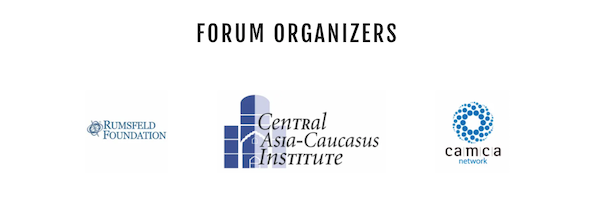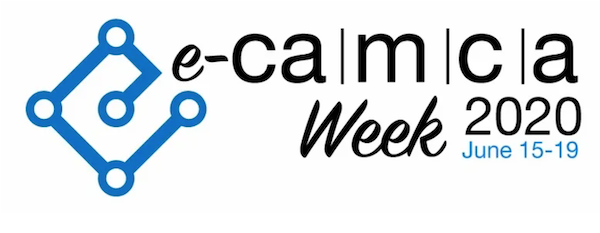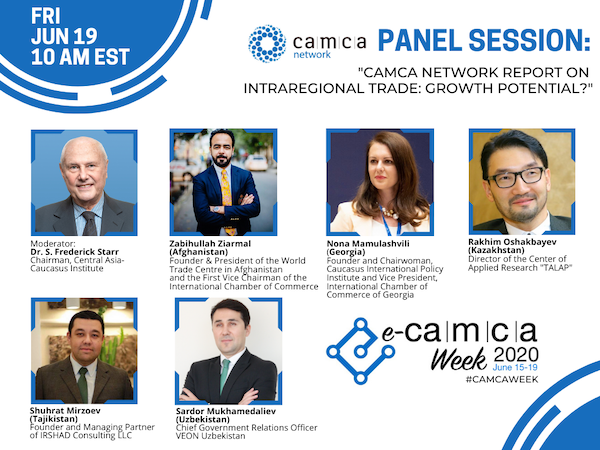CACI releases Silk Road Papers on State and Religion in Kyrgyzstan and Turkmenistan
Religion and the Secular State in Central Asia: The Examples of Kyrgyzstan and Turkmenistan

This event marked the publication of two Silk Road Papers on the state-religion relationships in Central Asia, a study of Kyrgyzstan by Johan Engvall and one on Turkmenistan by Victoria Clement. This forms part of the ongoing research effort on secular governance, religion and politics at the Central Asia-Caucasus Institute & Silk Road Studies Program Joint Center, and follows the publication of studies on Azerbaijan, Kazakhstan and Uzbekistan.
Johan Engvall’s study of Kyrgyzstan’s experience is timely given that country’s experience, starting with a more permissive atmosphere that subsequently aligned itself with policies in the rest of the region. Victoria Clement’s study of Turkmenistan is the first treatment of the subject to appear in print, and sheds light on the similarities of Turkmenistan’s approach with the rest of Central Asia as well as its specificities.
Speakers:
Victoria Clement, Eurasia Regional Analyst, Center For Advanced Operational Culture Learning, Marine Corps University
Johan Engvall, Senior Research Fellow, Foreign Policy Research Institute
Moderator: Svante E. Cornell, Director, Central Asia-Caucasus Institute at AFPC
When: Monday, June 15, 2020 at 10am EDT
The Event was live-streamed on our Facebook page and is available on our YouTube page and here.
e-CAMCA Week 2020
In lieu of our in-person annual gathering, the CAMCA Regional Forum organizers are hosting a virtual e-CAMCA Week.
From June 15th-19th we will be hosting a daily live speaker session or panel, as well as releasing a variety of original content and helpful resources, for our CAMCA Forum community. We’ve pulled together a terrific collection of experts from across sectors, including members of the CAMCA Network, that will be delivering the latest on what you need to know about the region during the COVID-19 crisis and beyond.
Live video events will take place at 10 AM EST daily from June 16th-19th .
TUNE IN HERE to our Facebook page for live video events (full agenda below) and
SUBSCRIBE BELOW to receive the aforementioned release
VIEW THE FULL AGENDA DETAILS HERE


E-CAMCA WEEK PUBLICATIONS
Welcome Letter
Letter from Secretary Donald Rumsfeld
e-CAMCA Week 2020 participants
Meet CAMCA Entrepreneurs
View features of some successful regional entrepreneurs from our CAMCA Network
"Caucasus & Central Asia Post COVID-19" Series- Volume I
Digital Transformation in the CAMCA Region
Post COVID-19: Challeges & Opportunities for the Region

[Video Posted] CACI Online Forum: Religion and the Secular State in Central Asia: The Examples of Kyrgyzstan and Turkmenistan
Religion and the Secular State in Central Asia: The Examples of Kyrgyzstan and Turkmenistan
This event marks the publication of two Silk Road Papers on the state-religion relationships in Central Asia, a study of Kyrgyzstan by Johan Engvall and one on Turkmenistan by Victoria Clement. This forms part of the ongoing research effort on secular governance, religion and politics at the Central Asia-Caucasus Institute & Silk Road Studies Program Joint Center, and follows the publication of studies on Azerbaijan, Kazakhstan and Uzbekistan.
Johan Engvall’s study of Kyrgyzstan’s experience is timely given that country’s experience, starting with a more permissive atmosphere that subsequently aligned itself with policies in the rest of the region. Victoria Clement’s study of Turkmenistan is the first treatment of the subject to appear in print, and sheds light on the similarities of Turkmenistan’s approach with the rest of Central Asia as well as its specificities.
Speakers:
Victoria Clement, Eurasia Regional Analyst, Center For Advanced Operational Culture Learning, Marine Corps University
Johan Engvall, Senior Research Fellow, Foreign Policy Research Institute
Moderator: Svante E. Cornell, Director, Central Asia-Caucasus Institute at AFPC
When: Monday, June 15, 2020 at 10am EDT
The event was live-streamed on our Facebook page and is now available on Youtube.
A New Strategy for Central Asia
U.S. Central Asia policy has room to improve, but the Trump administration is steering things on the right track.
S. Frederick Starr and Svante Cornell
The Hill, Febuary 18, 2020
This month, the Trump administration released its strategy for Central Asia. This marks the first time in more than two decades that the United States has come up with a serious approach to a region where vast economic, geopolitical, and civilizational stakes are at issue. It follows visits by Secretary of State Mike Pompeo to Kazakhstan and Uzbekistan, the first trip to the region by someone in that role in half a decade.
Long seen as a stagnant land of Soviet holdovers, Central Asia has been undergoing a dramatic transition led by its two most powerful countries, Kazakhstan and Uzbekistan. Leaders in both countries have plunged into meaningful domestic reforms that are now focused on expanding citizen rights, governmental responsiveness, and the rule of law. They have also taken some important steps toward establishing their own structures for regional cooperation, a process that could result in a kind of Central Asian version of the Association of Southeast Asian Nations.
CACI, IREX, and USAGM Panel Discussion Invitation: Taking Stock
Taking Stock Invitation: One Year After Uzbekistan Pledges Reforms
The Central Asia-Caucasus Institute, alongside of the U.S. Agency for Global Media, and IREX are hosting a panel discussion to mark the first anniversary of the new era of cooperation between Washington and Tashkent. One year after Uzbek President Mirziyoyev’s historic May 2018 visit to the United States, a panel of experts will discuss what changes are underway in the strategic Central Asia nation. Topics of discussion include U.S.-Uzbek cooperation, new international activities, and reformation in the economic and media sectors of the country.
Featuring:
His Excellency Javlon Vakhabov, Uzbek Ambassador to the United States
Lisa Curtis, Deputy Assistant to the President and National Security Council Senior Director for South and Central Asia
Dr. Frederick Starr, Chairman, Central Asia -Caucasus Institute and Silk Road Studies Program
Navbahor Imamova, Journalist, VOA Uzbek Service
Moderator: Alicia Phillips Mandaville IREX Vice President for Global Programs
Where: IREX, Suite 600, 1275 K St. NW, Washington, DC
When: Thursday, May 30, 2019 from 2:00 - 3:30 pm,
RSVP: Click HERE to register




